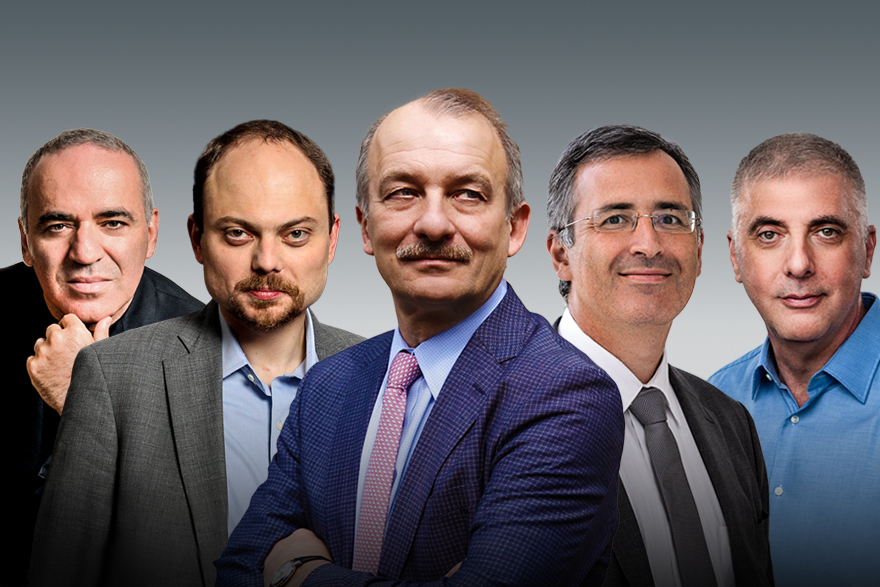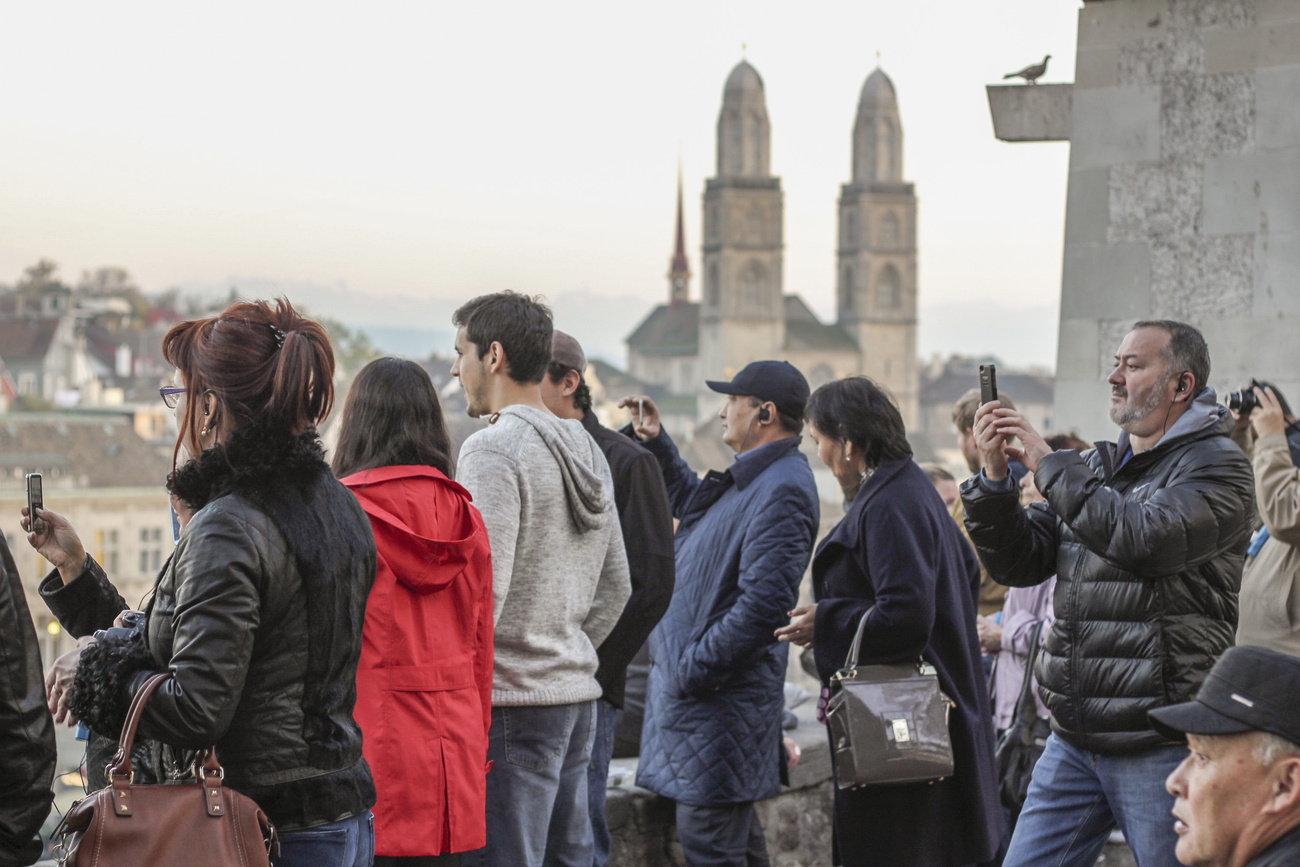
‘My psyche was completely unprepared for what was happening’

The announcement of partial mobilisation in Russia has been a watershed moment for the population. One man who fled Moscow for Switzerland explains how everything changed the day President Vladimir Putin called up reservists to fight in Ukraine.
The call for military reservists to serve on the frontlines has proved to be a point of no return for many Russians. After the invasion of Ukraine began, a kind of unspoken social contract had prevailed in Russia: the “special military operation” to “denazify and demilitarise” Ukraine would be conducted by professionals, while everyone else would watch it unfold on television. Last September, however, all of this changed.
The prospect of coming home from work as usual one evening and winding up near Kherson or Bachmut two days later became a highly realistic – if difficult-to-accept – scenario for many Russians. Among them is Vladislav Donchenko. Poorly trained and unmotivated men who are being forcibly drafted have little chance of surviving combat operations. Being called up in Russia today is thus tantamount to a death sentence.
According to estimates, some 700,000 men have fled the country since partial mobilisation was announced on September 21. Of these, around 200,000 went to neighbouring Kazakhstan, according to the Russian edition of Forbes magazine. Others, like Donchenko, made it to Western Europe. SWI swissinfo.ch spoke to him in a small café opposite the federal parliament building in Bern.

More
Leading Russian opposition figures criticise Switzerland
Donchenko’s father is Ukrainian and his mother is Russian. His parents divorced when he was four years old. Donchenko moved with his mother to Yaroslavl, a small town north of Moscow. He spent his childhood summers in the Poltava region of Ukraine, and later studied in Moscow. He declines to specify whether he is Russian or Ukrainian.
“I have Cossack blood in me, but I graduated from Moscow State Technical University, with a degree in internal combustion engine design,” he says. “Basically, I have lived all my adult life in Moscow.”
The first shock – and the second
“When the war started on February 24, I just couldn’t believe it,” he recalls. “My psyche was completely unprepared for what was happening. I thought it would end like in 2021, when Russian troops advanced to the border with Ukraine, but then only carried out a military exercise. I was absolutely certain the same would happen again. I wrote to my aunt in Kyiv to ask how she was, and she told me she had been woken that morning by the sound of explosions.”
“I was completely beside myself. I couldn’t work all day, but just sat in the office glued to the news. I knew I had to go out on the streets and demonstrate, and I was sure that many others would do the same – like the rallies in support of [jailed opposition figure] Alexei Navalny.” To his disappointment, though, this was not the case. Small groups of people did gather around the Pushkin monument on a popular square in central Moscow, but that was all. This public passivity was a “second shock” for him.
“If you consider that there are more than 15 million people living in Moscow, those who were out on the streets protesting against launching cruise missiles over Ukraine were clearly just a drop in the ocean,” he says.
Had he tried to explain to himself why this was? “Of course,” he replies. The reasons were the usual ones – fear of being imprisoned for the slightest insubordination to the police. “It’s the repressive apparatus that has been created in Russia,” he adds. “Everyone is afraid. I realised I was also a target. But I didn’t even think about it at the time, because it was so insignificant compared to the horrors unfolding in Ukraine.”
Drafting protesters
Donchenko explains that he took part in three anti-war protests in those early weeks, until he finally understood that this would only lead him to prison. Meanwhile, he saw other Muscovites calmly strolling around, drinking coffee and eating in cafés and restaurants – even as civilians in Mariupol were dying under Russian bombs. Donchenko left Russia in early March and travelled via Istanbul to Switzerland, where he stayed with his sister for two months. He returned to Russia in July.
He is reluctant to talk much about it but says that he sort of got used to the situation, and above all felt the need to get on with his life – especially as he was unable to work in Switzerland. Then the mobilisation started.
“I went out to demonstrate again, in Yaroslavl,” he says. “Four days later, I travelled to Moscow to take part in a protest there, but there were even fewer people than the day the war started. And there were even more police and even more arrests.”

More
Tourist visa ban for Russians divides Europe
Donchenko does not describe himself as someone who, like Navalny, is prepared to go to prison for his ideas. He is a normal person, a representative of the middle class who would be a pillar of society in any other country, including Switzerland – anywhere other than in Russia. He then learned that all those arrested at anti-war demonstrations had been summoned by the army recruitment offices. “I was also afraid of receiving a summons, but it was also unthinkable for me to stop demonstrating,” he explains.
“Besides, after receiving a summons, you can no longer legally leave the country. This is what really triggered my decision to leave. I managed to buy a bus ticket to Helsinki and from there flew to my sister in Switzerland. The next day I learned that a Ministry of Defence mobilisation station had been set up at the border crossing where I had left the country. I can still remember the feeling of relief the minute I got across the border.”
Propaganda is to blame
Do the Russian people really support the war? According to media reports, at least 50% of the Russian population is in favour of it. Or have people just got used to not taking political responsibility? In Donchenko’s social circle, comprised of young, well-educated 20-somethings, those backing the war can be counted on the fingers of one hand. However, most people prefer to minimise their personal risk, he says.
People see no point in demonstrating if it has no political effect and is likely to land them a prison sentence, he adds. But are Russians aware that their country, like Germany not so long ago, is burdening itself with a historical guilt for which it will have to atone for decades to come? Donchenko’s answer is quick and clear: “No, they aren’t!” The main culprit, he says, is propaganda – a weapon no less lethal than the missiles and drones that Russia is using to destroy Ukrainian cities today.
Three Swiss francs a day
After arriving in Switzerland in late September, Donchenko headed straight to the federal asylum centre in Zurich. As he speaks English, he was able to communicate directly with the migration authorities. “When I went to the centre to apply for refugee status, I didn’t expect to be kept there overnight,” he says. “However, this was not detention. It is obvious that when you are applying for refugee status, you have to accept certain obligations.”
The migration officials first took all the papers he had brought with him, soon returning everything except for his international Russian passport and domestic Russian passport. Based on these documents, he was issued an official certificate identifying him as an asylum applicant. As the Zurich asylum centre was overcrowded, he was transferred to the canton of Bern.

More
Are Russian deserters entitled to asylum?
“I have to be back at my accommodation between 9pm and 9am, and I also have to get to my interview with the authorities on time,” he explains. “These are my two main obligations.” At the asylum centre, he gets three meals a day. He would be given clothes if he had none of his own. Asylum seekers in Bern receive personal hygiene items plus CHF3 ($3) a day in spending money. Donchenko does not know exactly when his interview with the authorities will be, but he has to be contactable every evening, as the day and time are usually communicated only the night before.
He is surprised that no one has yet asked him officially why he actually had to leave Russia and why he is seeking asylum in Switzerland. He knows that the Swiss migration authorities generally treat applicants fairly. He already experienced this himself, at the beginning of the Covid pandemic, when he got into difficulty after visiting his sister in Switzerland and all flights were cancelled and his visa had expired. Donchenko is hopeful that the outcome of his case will be positive.
Adapted from German by Julia Bassam/gw

In compliance with the JTI standards
More: SWI swissinfo.ch certified by the Journalism Trust Initiative





























You can find an overview of ongoing debates with our journalists here . Please join us!
If you want to start a conversation about a topic raised in this article or want to report factual errors, email us at english@swissinfo.ch.